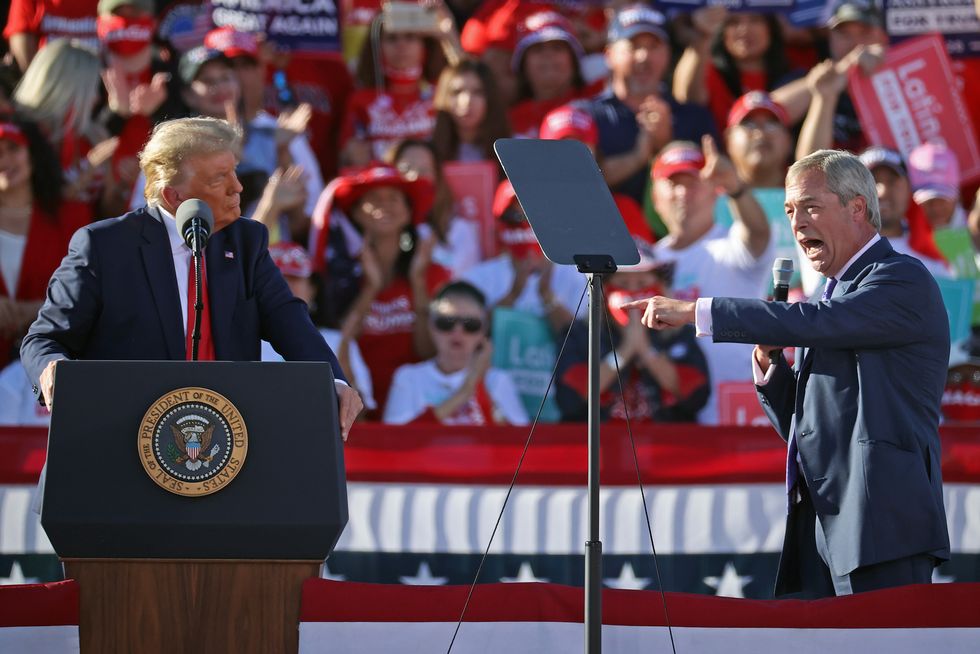Biden’s tenure in the White House has been marked by numerous domestic failures and constitutional overreaches. His foreign policy has notably damaged the once-celebrated “Special Relationship” between the US and UK, not to mention America’s standing in the world.
The administration’s handling of funds has been egregious, with billions from COVID-19 relief packages going unspent, and Biden’s so-called signature “Inflation Reduction Act” doing little to curb inflation—in some cases, increasing it—while handing out special interest benefits. This act’s attempt to lower prescription drug costs has instead shifted these costs into higher insurance premiums, demonstrating a clear policy failure. Additionally, under Biden, the US has experienced the most significant assault on free speech in US history, coupled with the appalling use of the justice system to target political opponents.

Joe Biden has been largely hostile to the UK during his time as President.
Getty Images
On the international stage, Biden inherited a world in relative peace but has left it fraught with major conflicts and a resurgent Iran. The chaotic withdrawal from Afghanistan stands out as a particular humiliation, signaling a decline in US military readiness and international clout. Biden has imperiled the West, emboldening its enemies and alienating the USA’s closest partners, most alarmingly, the UK.
Biden’s Irish identity seems to have clouded his foreign policy with an almost folkloric hostility towards Britain. His actions, like spending far more time in the Irish Republic than in Belfast during a crucial visit, his April 2023 photo op with Gerry Adams, which was seen as an affront to those impacted by IRA violence, and his administration’s sacrosanct attitude regarding the Good Friday Agreement, all paint a picture of a president with an anti-British bias. His absence from King Charles’s coronation and the snub of then-Prime Minister Rishi Sunak in Belfast further illustrate this strained relationship. Moreover, Biden’s failure to support Ben Wallace for a NATO position, possibly due to identity politics, and his lack of communication with UK leaders during critical moments, such as the Afghanistan withdrawal, have only compounded the damage.
Donald Trump’s arrival, if not squandered by Starmer’s unpopular leadership represents the turning of a page to a profoundly more pro-British posture. In his first term, Trump advocated strongly for a free trade deal post-Brexit and voiced great support for the UK’s democratic choice to leave the EU. Trump’s affection for Britain, rooted in his mother’s heritage, made him a natural ally. Biden, was more of a Eurofederalist at heart, favoring the Paris-Berlin-Brussels axis over the transatlantic relationship with Britain.

Donald Trump’s friendship with Nigel Farage could offer hope in repairing the Special Relationship.
Getty Images
Under Biden, the US has missed significant trade opportunities with the UK, its most supportive partner in Europe. His protectionist policies have hindered mutual economic benefits, contrasting sharply with the UK’s openness to free trade alliances, especially in technology sectors where the UK has been notably accommodating to US companies.
The Special Relationship has proven crucial for maintaining a rules-based international order, yet Biden’s actions have weakened this bond at a time when solidarity against adversaries like Russia and China is vital. The return of Trump to the White House, particularly with Nigel Farage and Elon Musk massaging relations, offers hope that Britain may one day embrace the path of championing a thriving, low-tax, low-regulation economy built on innovation and growth. While painfully unlikely in the short run, the groundwork could be laid for 2029.
As Biden’s time in office ends, the narrative of his presidency is one of domestic and international failure, notably in its impact on the US-UK relationship. It’s time for both nations to look forward to a new chapter where, if Starmer doesn’t poison the waters, Trump’s bold way forward leads to greater prosperity, security, and a revitalized partnership—one grounded in shared economic values and a commitment to mutual success. The opportunity is there for both nations to realign, strengthening their bond in ways that benefit all.